The Cracks We Pretend Not To See
We wake up, scroll through a sea of content designed to keep us angry, numb and divided, indulge in luxuries made affordable by a system that thrives on forced labour, eat fruit that barely tastes like fruit we used to remember, breathe air that carries the weight of industrial byproducts, and go about our day pretending everything is normal.
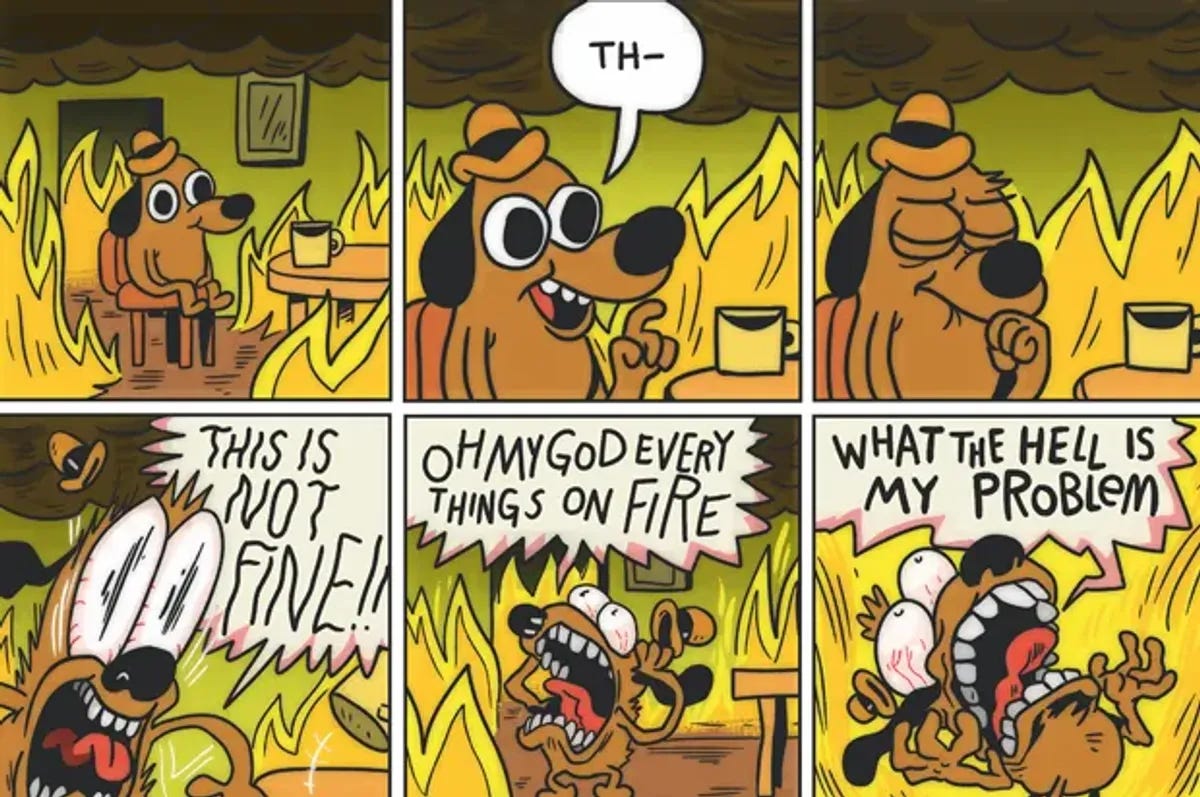
Except, it’s really not ok.
The societal cracks are getting more noticeable day by day and these ‘cracks’ are everywhere. Watch Steve Cutt’s 4-minute Happiness animation and you’ll see modern life condensed into a bleak, although painfully accurate portrayal of the reality of our modern world. We have been conditioned to chase joy in all the wrong places and most of us are trapped in cycles of consumption and numbed by distractions. It is no wonder why the terms “feeling empty” and “loneliness pandemic” popped up in public discourse so often these days.
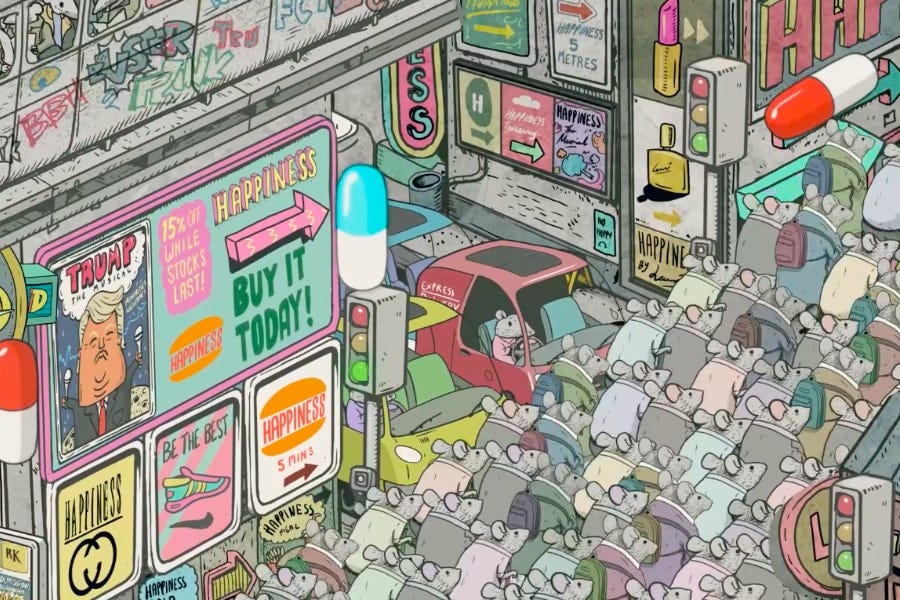
The food we eat has been hollowed out (Read: BBC’s article on “Why modern food lost its nutrients”). The connections we have with others are thinning (Read: Sherry Turkle’s “Alone Together” on how technology warped our social lives as well as our inner ones). The world around us is unraveling in ways that are both deeply personal and disturbingly systemic.
But instead of facing it, some of us are clinging to comfort, to convenience, to the illusion that someone, somewhere, will sort it all out before it’s too late. And unfortunately, it is already too late.
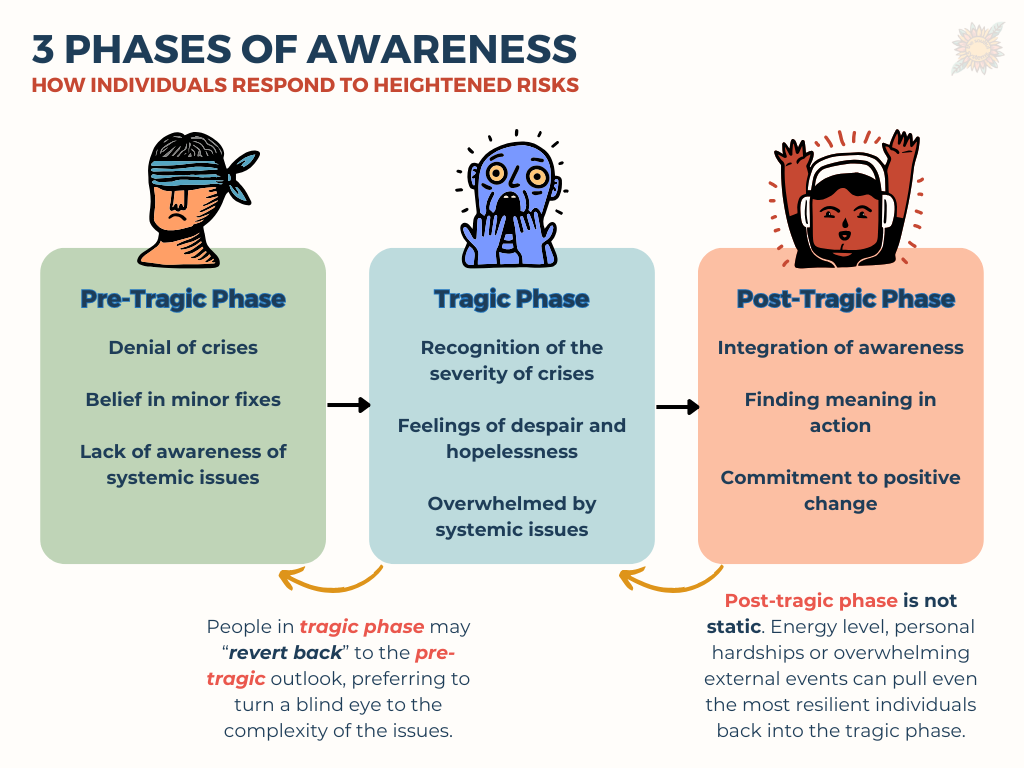
Those in “Pre-Tragic” phase would rather not see nor talk about it. Those in “Tragic” phase are paralysed by it. And those in “Post-Tragic” phase understand that there’s no going back. The only way forward is through accepting the inevitable collapse of the old systems, integrating reality, really seeing what’s happening in front of us, and moving with clarity despite the uncertainty in global affairs unfolding right now.
“The truth will set you free. But first, it will make you miserable.”
— James A. Garfield, the 20th US president and an advocate for civil rights and education
Food That Fills But Doesn’t Nourish
In the 1980s, a tomato had twice the amount of calcium it does today. A carrot had more magnesium. An orange had more vitamin C. Over decades, we have bred the nutrition out of our food, industrial agriculture has prioritised shelf life, uniformity, and transportability over taste and sustenance. Our produce may look bigger, more beautiful looking and shinier, but it no longer functions the same.
We have created a world where bananas are on the brink of collapse because monoculture farming has stripped them of genetic diversity. Where rice, wheat, and corn have been modified to produce more calories but fewer nutrients. Where entire crops fail overnight because they have been weakened to the point of dependency on chemicals that are themselves failing.
How uncanny is it that modern humans and industrial crops share the same fate? We’ve also been optimised for high output but stripped of resilience. We are pushed to be “high-yield humans”, maximally productive and always available, but at the cost of deep emotional nourishment, true rest and meaningful relationships. Just as over-farmed soil stops producing, overworked people hit burnout, losing our ability to engage, feel joy or even function properly. And instead of addressing the root causes of stress and burnout, we are ushered towards quick fixes with overmedication, toxic positivity, and avoidance, much like how industrial farming sprays chemicals instead of restoring soil health.
When food loses its purpose, what about us?
Regenerating The Land: What it means and why it matters
There are people who see this collapse and refuse to accept it. People who have walked away from a system that treats land like a resource to be extracted and humans like machines to be optimised. People like Dave.
Dave left Europe in search of something real, something tangible. He now lives in the foothills of the Cardamon Mountains in Chantaburi province in Thailand, restoring a piece of land that had been degraded and stripped of its natural balance, from soil to water and air. He and his wife, Karn, are learning how to live with the land by actively healing and transforming it into a food jungle that mimics natural ecosystems, increasing biodiversity and fertility through regenerative approaches.
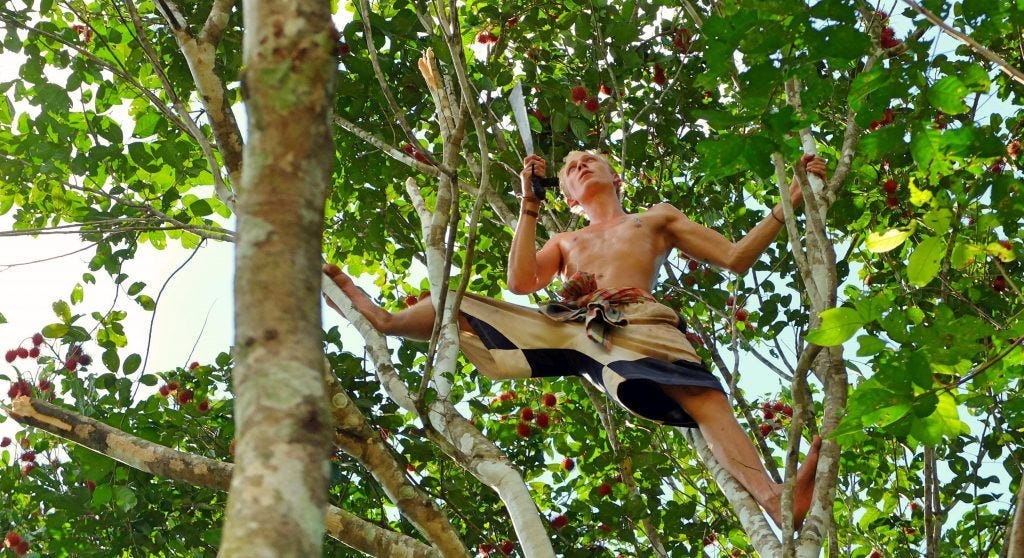
To regenerate is to listen — to watch the patterns of nature, to understand what the land needs, and to cultivate in a way that heals instead of depletes. Dave and Karn’s passion and resilience are inspiring as it demands patience, humility, and willingness to unlearn everything the modern world has taught us about efficiency.
But more than anything, it demands breaking away from convenience. And this is where most of us falter.
The Paradox of Convenience
Our world worships ease. From one-click ordering to same-day delivery to pre-packaged meals, we’re surrounded by tools that promise to remove “friction” from our lives. We no longer have to struggle to acquire knowledge, to navigate relationships, or to even prepare our own food.
Essentially, convenience has made us spoilt human beings. It has conditioned us to expect everything to be easy and to resist discomfort at all costs. It has made us impatient, unwilling to invest time in learning, in growing, or engaging with anything that doesn’t deliver immediate results. It has discouraged deep thinking and meaningful conversation. It has made us passive consumers in a system that profit from our passivity.
But worst of all, it has isolated us.
When life becomes all about optimising for efficiency, relationships become transactional. Conversations are shallow because depth takes time, as time is something we’re always trying to save. Families become fragmented, each member lost in their own algorithmically curated digital reality.
The irony that I started to notice is that our obsession with convenience has actually made our life harder in some aspects. Harder to find meaning. Harder to build resilience. Harder to connect.
Many people don’t even know what deep connection feels like anymore. We have become accustomed to surface-level interactions, to performance over authenticity. We have mistaken followers for friends, likes for love, engagement for intimacy. And in the process, we’ve forgotten how to truly see and be seen.
Why Living Authentically Makes Others Uncomfortable
To step away from the system is to make people uneasy.
Try telling someone you don’t use social media. Try saying you would rather cook than eat at the restaurant. Try explaining why you don’t want a corporate job, why you choose to grow your own food, why you prioritise meaningful work over financial security and watch their reactions.
Living authentically exposes the unexamined choices of those around you. It forces people to question their own lives, and most would rather not. Most would rather assume you are strange, idealistic, or impractical than confront the possibility that they are living in ways that contradict their deepest values.
So, What Do We Do With This Awareness?
We start by refusing to look away and embrace the Tragic phase.
We reclaim our attention. We break free from passive consumption and engage with the world in a way that is deliberate and thoughtful. We question the stories we’ve been told about what success looks like, what progress means, and what it takes to live a good and decent life.
And we listen. We listen to the farmers who are warning us about soil depletion. We listen to the scientists who are telling us that climate predictions keep underestimating the speed of change. We listen to the people who have chosen a different path. Not to romanticise their struggle, but to understand what it takes to break free.
We reconnect with food that nourishes, with land that sustains, with people who are willing to have real conversations, especially when things get difficult. We cultivate the patience and resilience needed to build a life that isn’t dictated by algorithms and market forces.
The metacrisis of the everyday thrives on our inertia, our un-willingness to challenge the status quo. And small acts of resistance matter more than you realise. Growing a garden. Learning how to cook from scratch. Having an interrupted meaningful conversation. Choosing to live in alignment with the deeper values even when it’s socially inconvenient.
The old ways are already falling apart. Donald Trump’s presidency was a testament to this — a shared global moment that exposed the cracks in the institutions, the fragility of the systems we blindly trusted, and the devastating consequences of ignoring deep societal decay for this long.
And when others frown upon it, keep going. Their resistance is often deep-rooted in fear; fear of what they might see in themselves if they were to slow down and face reality too.
And to those who feel overwhelmed and don’t know where to begin, here are some pointers to help navigate resistance and pushback, as well as living more intentionally;
Become Comfortable with Being Uncomfortable — People will frown upon your choices, question your decisions, and sometimes even mock your attempts to live differently. When that happens, remember: discomfort is information. Ask yourself, Is their resistance about me, or is it about them? because most of the time, it’s about them.
Learn to Disappoint the Right People — You will never please everyone. If you choose to live differently, whether that’s eating better, stepping away from distractions, or prioritising real relationships, some people will be disappointed. That’s okay. Ask yourself, Who are you willing to disappoint? The people who expect you to conform, or yourself?
Normalise Changing Your Mind — If you grew up believing in certain ideas, about success, relationships, happiness, you might struggle to let go of them. “In the end we come to realise that it is the unexamined lives of our parents that we ourselves end up living” (Read: my piece on “Why Are We Wounded?”). You are allowed to change your mind. You are allowed to see things differently to what your parents have taught you. Adaptation to the changing world is wisdom, not weakness.
Choose Meaning Over Approval — Many people live their lives trying to be liked rather than being true to themselves. But approval is fleeting, and most of the time, the people whose approval we seek are too caught up in their own battles to notice. Do what is meaningful, even if it makes you less popular. The right people will find you.
Stop Explaining Yourself to Those Who Don’t Want to Understand — It’s natural to want others to understand your choices, but not everyone is open to listening. Pay attention to how they respond, do they engage with curiosity, or dismiss and argue? Clarity is valuable, but only if the other person is willing to receive it. Share when it feels right, but don’t waste energy justifying yourself to those who have already decided not to understand.
Last thoughts;
Last week, I launched a new initiative called Soulful Gathering. I hope to shape a space that allows for deeper exchanges and meaningful connection. To start off, I created a 10-question anonymous “Get To Know Each Other” survey to better understand the people drawn to this idea. You can read my personal answers on there, too. Once the responses are in, I’ll share insights from what I’ve gathered, revealing what others long for in a world that often feels disconnected and shallow.
Steve Cutts is a British illustrator and animator whose work I shared at the beginning of this piece. I admire how he distills the absurdities of modern life — calling out rampant consumerism, corporate exploitation, environmental destruction and social decay. His work is darkly humorous and wonderfully striking, and the fact that he has garnered a lot of backlash online is an everyday proof of how deeply people resist seeing the system we are trapped in, and taking the route of attacking the messenger rather than confronting the message. If you want to see more of his work, I highly recommend watching Man, Brief Disagreement, and his collaboration with Moby in Are You Lost in the World Like Me? music video.
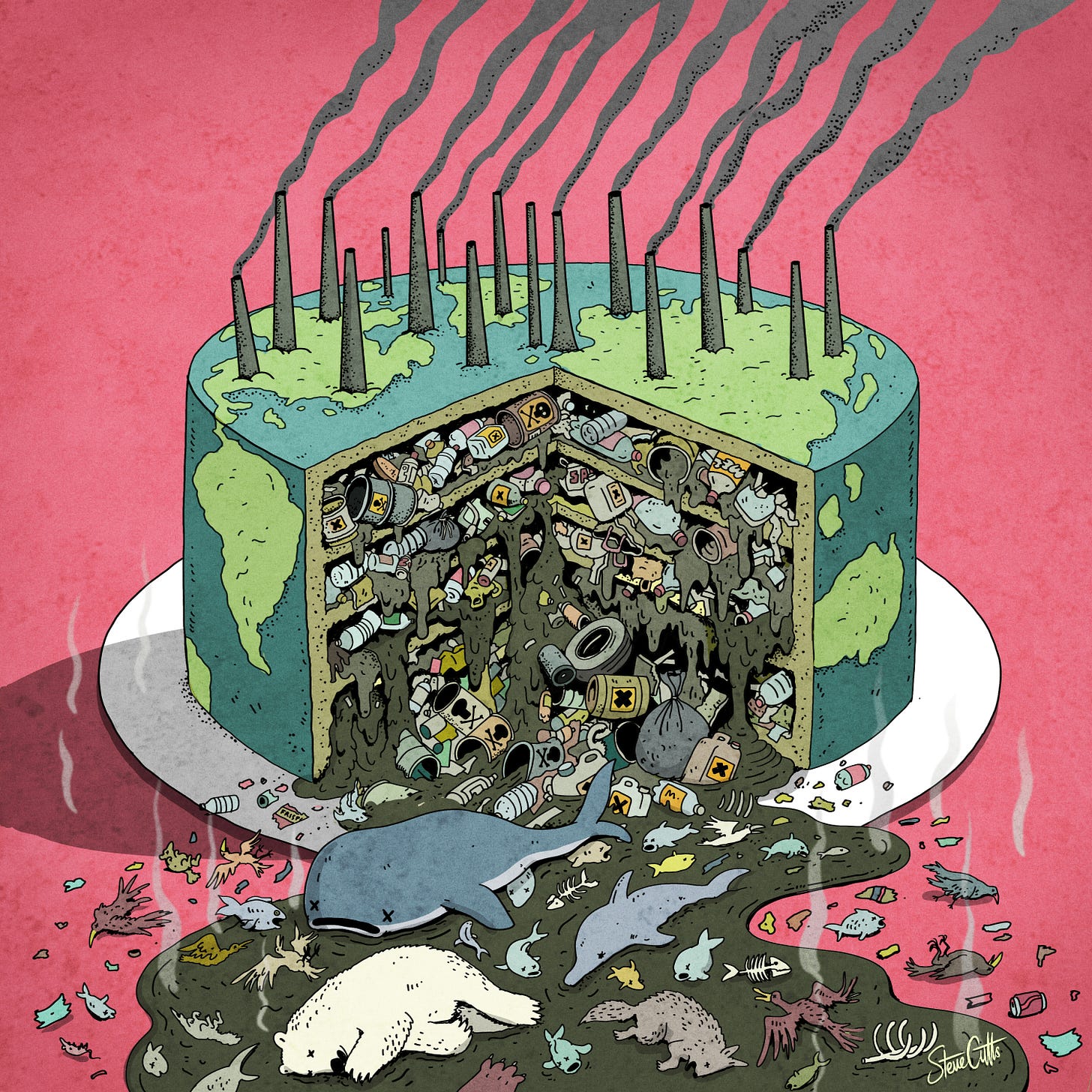





The human problem is friction.
There is little friction, and we live at an accelerated pace (ironically, perhaps we want to go from the cradle to the grave as quickly as possible).
There is a lot of friction, and we hardly move. The comfort traps us (perhaps the most superb comfort where we no longer move is in the grave, ironically).
There is a golden mean where friction is paradoxically "Life".
Excellent essay. You write very well, and follow the cardinal rule of omitting needless words beautifully.
I find myself sloshing around in the five stages of grief. I’m never able to stay in the post-tragic phase for long, as my depression as well as outrage about mankind’s behavior keeps pulling me back into despair and justifiable anger. I need a helping hand but almost everyone capable of understanding seem to be fighting their own battles to retain their sanity and get back to living something remotely resembling a happy and meaningful life.
Truly hard times. I appreciate your helpful suggestions and links.